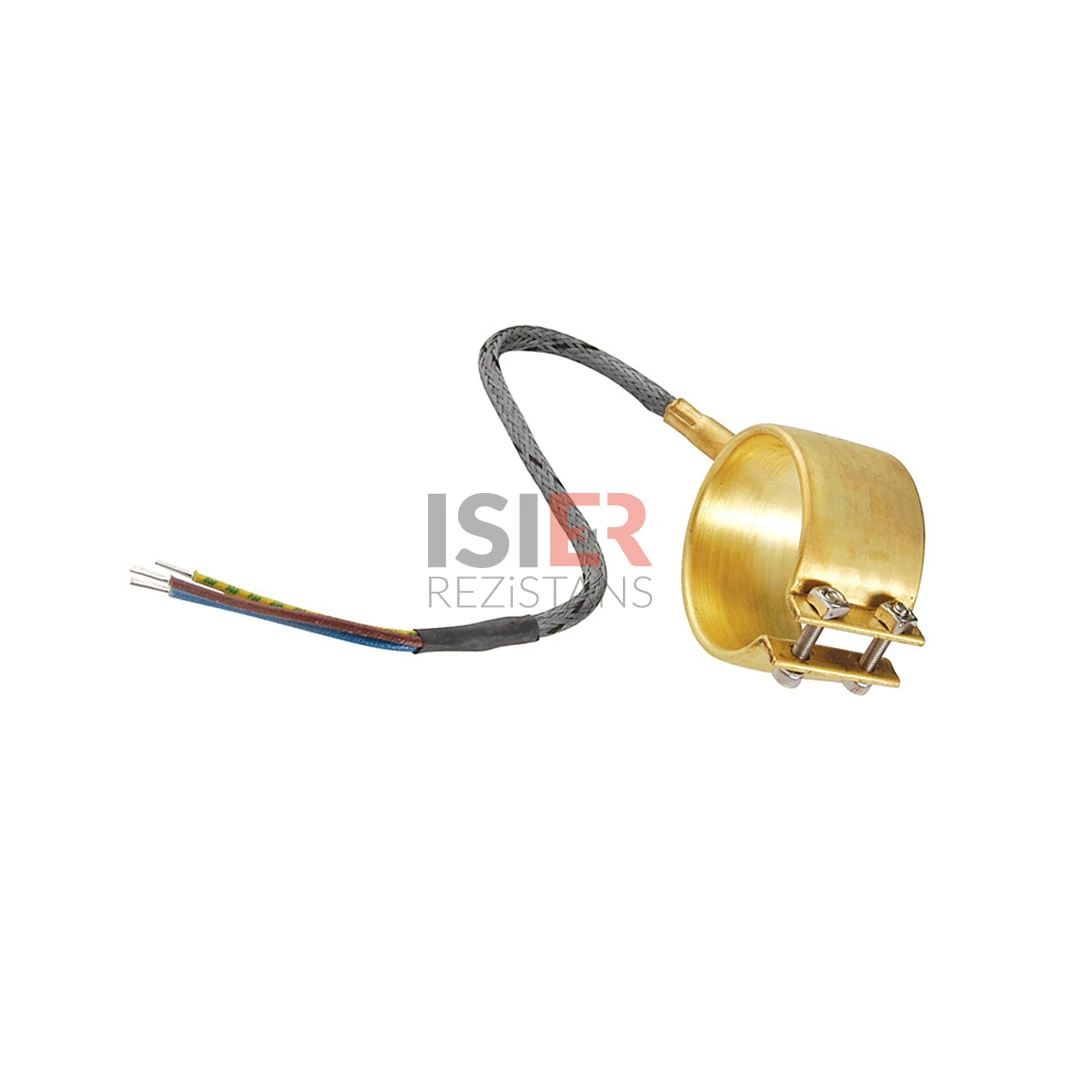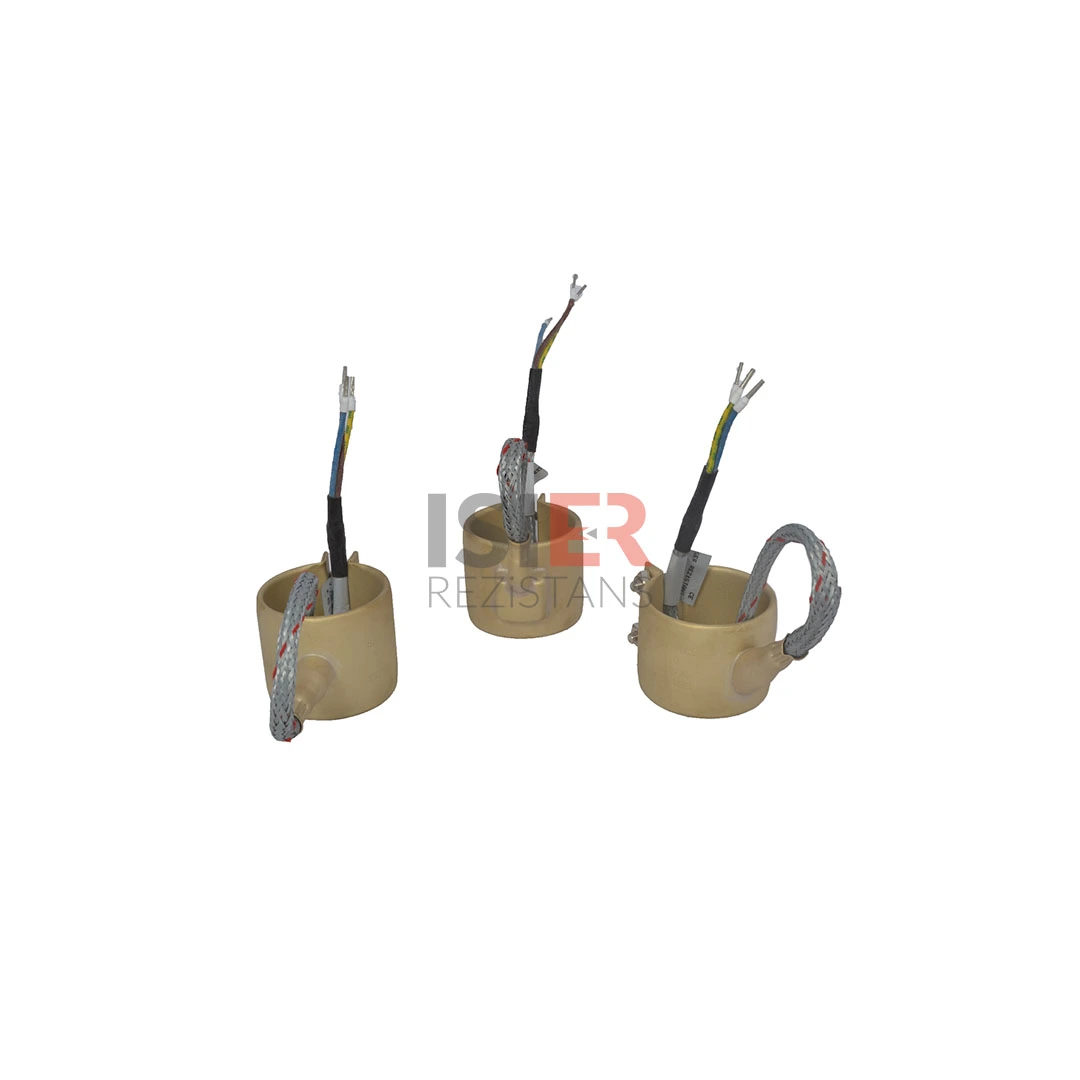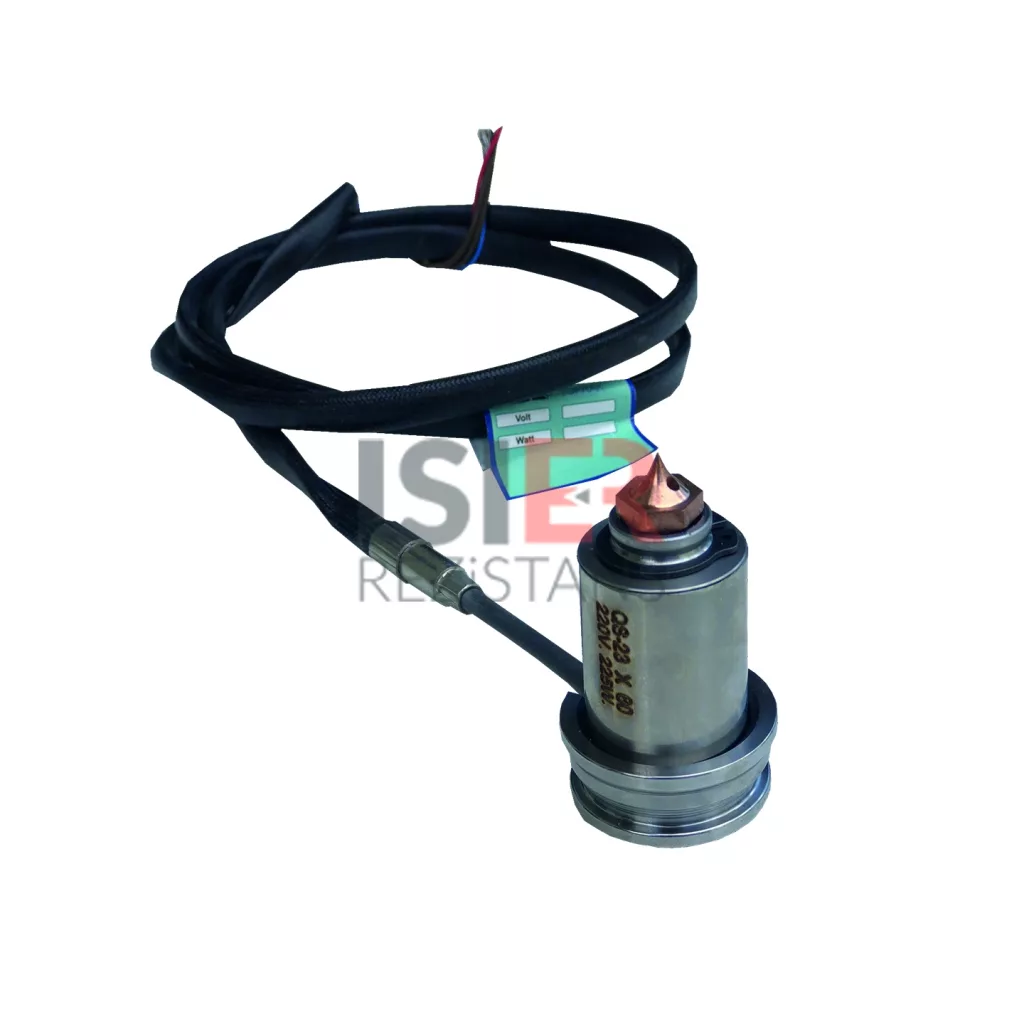Nozzle Heaters
Heaters are the type of resistance that provides the manifold main entrance udder and the main entrance udder for heating. These types of resistors are made of 80/20 1100ºC chrome-nickel wire, high purity mica, natural mica, brass profile or stainless profile. M5 stainless impus screw and special nut are used. In the special connection box, 50 cm imported steel braided armored cable with resistance tips is combined with punta welding. Insulation is provided by 400ºC glass fiber macaron and special static end stone.
In Nozzle Heaters, energy outputs may be wired or with a klemens or iron plug. Nozzle Type Resistors are mica insulated and the operating temperature is maximum 350/400°C. Such resistors can be easily produced with self thermocouply on demand. In Nozzle Resistors, the minimum diameter is 25 mm Maximum 100 mm, the minimum size is 25 mm and the maximum diameter is 100 mm.
Nozzle Heaters are manufactured in models in different ways according to the desired shape and technical drawing. These resistors cannot be operated idle and must be used with 8mm thick pressure sheet on them. They are lasting resistors when easy to assemble and done correctly. It is specially manufactured.
Technical Information
Nozzle Heaters are made of brass profile or stainless material. The most important uses of Nozzle Type Resistances are nipple outlets in plastic injection machines. Due to the closed circuit of the production method, leakage of plastic raw materials on this resistance is not a major handicap, but increased leakage and density affect the of the Nozzle Type Resistance. Heaters are used in large diameter pipelines and heating circular shaped molds that need to be heated outside plastic injection machines.
Nozzle Heaters which are one of the most important resistors to be able to melt plastic raw materials, are also specially produced so that they be used in bacialite presses. Nozzle Heaters models are also used in the output molds of extruder machines.
What are Nozzle Heaters?
Heater nozzles are electrical components that represent the resistance through which a certain current can pass. Heater nozzles are used in many applications such as electronic devices, power distribution systems, and electromechanical systems.
Heater nozzles are made of metal filaments of a certain size and are color-coded according to the resistance properties of conductive materials. The distance between filaments determines the resistance and power of the heater nozzle. Heater nozzles can be produced in different materials such as metal, ceramic, or plastic and can include specific resistance, temperature resistance, and frequency response.
Heater nozzles are necessary for the proper functioning of many functions in electronic devices, such as power sources, signal amplifiers, noise filters, and temperature sensors. Additionally, they can be used in power distribution systems to reduce energy loss and improve power quality.
In summary, a heater nozzle is an electrical component that ensures a certain electrical current adheres to a specific resistance.
Nozzle Heating Usage Areas
Nozzle heaters can be used in the following applications:
Electronic devices: They can be used for many functions such as power sources, signal amplifiers, noise filters, and temperature sensors.
Electromechanical systems: They can be used in systems such as motors, transformers, and industrial drives.
Electric distribution systems: They can be used to reduce energy loss and improve power quality.
Power electronics: They can be used in applications such as DC-DC converters, power amplifiers, and power suppressors.
Noise and attenuation: They can be used to solve noise and attenuation problems in audio, video, or data signals.
Automatic test systems: They can be used in applications such as test equipment, test systems, and inspection systems.
These are just a few examples of applications, and nozzle heaters can be used in many other applications as well.
Nozzle Heaters Technical Specifications
Resistance (R): The limitation of electric current by a resistive element for AC signals.
Resistance Value (Ω): The limitation of electric current by a resistive element for DC signals.
Tolerance (±%): The deviation rate of a resistive element from the specified resistance value.
Temperature Coefficient (ppm/°C): The change in resistance value of a resistive element with temperature variation.
Maximum Temperature: The highest operating temperature of the resistive element.
Material: The type of material used in the construction of the resistive element (porcelain, nickel-chromium, nickel-iron chromium, etc.).
Dimensions: The dimensions of the resistive element (length, diameter, thickness, etc.).
Capacitance and Inductance: The capacitive and inductive properties of the resistive element.
Temperature Range: The temperature range of nozzle heaters is determined by the manufacturer and generally ranges from -55°C to 155°C. However, this value may vary among different models of nozzle heaters, and specifications provided by the manufacturer should be considered.
These technical specifications may vary among different models of nozzle heaters, and specifications provided by the manufacturer should be considered.
Nozzle Heaters
Nozzle heaters are a special type of heater used to heat the main entry nozzle area. These are typically manufactured from 80/20 chrome-nickel wire, high-quality mica, or brass or stainless steel profiles.
For assembly, M5 stainless steel impus screws and special nuts are used. Inside the connection box, the heater ends are joined with a 50 cm length of specially imported steel braided armored cable. Insulation is provided using glass fiber sleeves and special static end supports that can typically withstand up to 400ºC.
Nozzle Heaters Technical Details
Nozzle heaters can have energy outputs wired, terminal-based, or with iron plugs. Nozzle Type Heaters are typically insulated with mica and have a maximum operating temperature of 350/400°C. These types of heaters can optionally be produced with built-in thermocouples. Nozzle heaters can range from a minimum diameter of 25 mm to a maximum diameter of 100 mm, with lengths ranging from a minimum of 25 mm to a maximum of 100 mm. When properly installed and used with an 8mm thick pressure plate, they can have a long lifespan.
Nozzle heaters are made from brass profiles or stainless materials. The primary use of Nozzle Type Heaters is in the nozzle outlets of plastic injection machines. Due to the closed-loop production method, leakage of plastic material into these heaters typically does not pose a significant problem, but increased leakage and density can affect the lifespan of Nozzle Type Heaters. In addition to plastic injection machines, they are also used in areas such as heating non-large-diameter pipelines and circular-shaped molds.
Nozzle heaters play an important role in melting plastic raw materials and can also be used in Bakelite presses. Nozzle heater models are also used in the output molds of extruder machines.
Environmentally friendly Nozzle heaters have many different application areas today and are suitable for industrial use. The prices of Nozzle heaters can vary depending on the selected product’s specifications.
Nozzle Heaters Areas of Use
Nozzle heaters are heating elements that convert electrical energy into heat, typically in cylindrical or non-cylindrical shapes. They are used for various purposes in various industries. Here are detailed applications of nozzle heaters:
Plastic Injection Molding: Nozzle heaters used in plastic injection molding machines perform the function of heating the mold cavity. This ensures better flow of plastic material and facilitates the desired shape within the mold. It’s a commonly used heating solution in the plastic injection industry.
Extrusion Machines: Nozzle heaters are used in plastic extrusion machines to shape the melted plastic material as desired. In this process, the material is passed through a nozzle and heated to shape it.
Food Industry: In the food industry, nozzle heaters can be used for heating liquids or changing the viscosity of fluid substances. For example, they can be used for melting or maintaining products such as chocolate, honey, or jam in liquid form.
Packaging Industry: In the packaging industry, nozzle heaters can be used for heating packaging materials. Especially in thermoforming packaging machines, packaging materials are heated to shape them and enable the packaging of products.
Medical and Laboratory Applications: Some medical and laboratory equipment use nozzle heaters to accelerate chemical reactions or maintain liquids at specific temperatures. For example, water baths or incubators are often equipped with nozzle heaters.
Automotive Industry: In the automotive industry, nozzle heaters can be used in a variety of applications such as heating engine parts or oil. They are particularly used to improve the performance of vehicles in cold climates.
Chemical Industry: In the chemical industry, nozzle heaters can be used to accelerate chemical reactions or provide specific temperature conditions.
These applications demonstrate the wide range of applications for nozzle heaters and their essential role as a component in heating and shaping processes across many industries.








